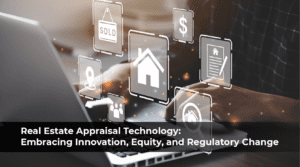Real estate appraisal technology is transforming the industry, with advancements like AVMs and desktop appraisals reshaping how valuations are conducted. As regulatory frameworks evolve and equity becomes a priority, the appraisal landscape is set for significant innovation.
Embracing Technology in Appraisals
One thing, real estate appraisal technology has ceased being a prospect of the future. New innovative tools have come on board and keep revolutionizing property appraisals, including automated valuation models and remote desktop appraisals.
For example, AVMs use sophisticated algorithms based on the values of comparable properties, previous sale prices, and market tendencies to arrive at house valuations in a fast and efficient manner. This real estate appraisal technology not only accelerates the process for appraisal but also enhances accuracy since the propensity for human error is diminished.
The goal of remote desktop appraisals is to streamline the inspection process and the writing of the appraisal report. Clients provide property data and inspection reports, collected by third-party inspectors, while the actual valuation is left to the appraisers. That way, the expertise and accuracy of the appraisers are assured without the need for time-consuming field inspections.
These are innovations already in place, and appraisers need to learn how to use different products while at the same time complying with reporting standards that are driven by technology in real estate appraisal.
Smarter Standards to Achieve Equity
One of the critical issues of real estate appraisal is fair value. Property valuation gaps were reflected in historical data, particularly in neighborhoods represented by the majority of minorities. Improving appraisal standards and practices to allow for consideration in a non-discriminatory and neutral manner has gained broader emphasis, especially in view of the increasing role of real estate appraisal technology.
Such standardization of the data gathered and valuation methods eradicate all chances of subjective bias on the part of an appraiser. The Uniform Appraisal Dataset, which compiled statistics on several million appraisals, speaks to industry changes toward nondiscrimination, precision, and equality. There are additional appeals for greater education among appraisers in understanding and mitigating biased appraisals.
Regulatory Shifts and Adjustment to Market Conditions
The regulatory apparatus as regards to real estate appraisal is also on trial as players in this market struggle to put up with the dynamic changes besetting them. Coupled with, or probably more accurately said, facilitated by, the advances in real estate appraisal technology, better licensing standards for appraisers would help in raising professional standards and lending greater credibility to this profession of appraisal. Changes have also occurred in mortgage lending rules that have impacted how loans will be granted based on appraisals. These changes also affect both the lender and the consumer.
Boston Appraisal Services: Learning New Challenges, Accepting Change
At Boston Appraisal Services, while availing state-of-the-art technologies, including AVMs—which are faster and more accurate—we are not unaware of its limitations. Sometimes, AVMs lack the depth of local knowledge that an experienced appraiser brings. They can miss subtle features or nuances of properties that a true local market would understand.
Because of these challenges, we merge our on-site competence with state-of-the-art real estate appraisal technology to make our clients confident that experienced appraisers are on their corner. This has been instrumental in ensuring that our valuations are truly data driven but enriched by deep and comprehensive local market insight. Furthermore, we continually revisit the sources of our data through AVMs or desktop appraisals with the view to finding potential information gaps and ensuring full accuracy at valuations.
Staying Current with Regulatory Changes
Another field in which Boston Appraisal Services excels is keeping up with regulatory changes. With any change in legislation or policy concerning the appraisal business, we are current to protect the interests of various stakeholders such as AMCs, lenders, buyers, sellers, estate agents, and attorneys. As technology in the field of real estate appraisal advances, so do we in order to stay ahead of the pack.
Conclusion
The future of appraisal in real estate would be luminous, filled with huge opportunity and massive challenges. Success in this field is much easier to achieve for all parties involved if the concentration is on real estate appraisal technology, equity, and regulatory adaptation. As such, these aforementioned elements will form the bedrock needed for the next stage of change for real estate appraisals to continue to hold integrity and reliability.
Boston Appraisal Services is pledged to one guiding principle: to meet the challenges of the future in real estate appraisal by providing the most accurate, fair, and dependable appraisal reports so our clients can better make informed and positive decisions regarding real estate.




Add your first comment to this post